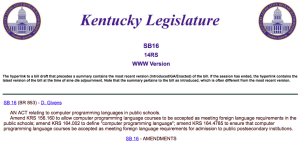“In terms of cognitive advantages, learning a system of signs, symbols and rules used to communicate — that is, language study — improves thinking by challenging the brain to recognize, negotiate meaning and master different language patterns. Coding does the same thing.”
For Kentucky students, a recent Senate Bill (SB16), introduced this legislative cycle could be an interesting game changer. Literally, a game changer. Raise your hand if you would prefer to learn to design and code an app or a game design instead of French, Spanish, or Greek. There is potentially some considerable controversy over this bill. Some recent news articles:
- Should Coding Be the New Foreign Language Requirement? (Edutopia)
- Bill Seeks to Encourage Programming Skills (WUKY)
- Kentucky Proposed Bill (LRC)
- The Sacramento Bee
- Other states considering similar legislation
“the process of developing and implementing various sets of instructions to enable a computer to do a certain task” is, after all, both a language and a foreign subject to many students — and much more.”
Several things are sticking with me about this.
- If the cognitive skills development is truly equal to that of foreign/ world language… then…
- Code Thinking (in many cases Design Thinking) is about an engineering and solutions process – not just a product. (it’s about the learning process)
- Trends are clear on the value of coding or code thinking.
- True that in 5 to 10 years most coding will likely be globally outsourced, like manufacturing is today. BUT it’s about thinking like a solutions engineer, like a designer. It’s the schema of design that will set our students apart – not the 1’s and 0’s.
- Choice in “language to be studied” is as expandable as the access to “a teacher” – why not expand to learn code language if there is access to “a teacher” (a teacher doesn’t necessarily have to equal the traditional idea of “teacher.”)?
While I love foreign/world languages, in fact, I’ve taken extra measures to have my own children in a Spanish Immersion program (spending half of every day immersed in spanish) – I also love the idea that there could be more accessible opportunities for code language and code thinking.
I’m just extremely pleased that we are not talking about a battle over cursive writing bill – like we were last year.
UPDATE: I asked, and received. Well kind of… Was stopped by a colleague who scoffed at the notion of coding being added to the Foreign Language requirements. “It’s just not right, you’ve got to be kidding me” …that’s all I got – in terms of debate or argument. I’m still looking for someone to convince me “Why no?”


I think–before you can make a decision about whether computer programming should count as a foreign language–you need to determine why it is we teach a foreign language in the first place. THEN you can determine if computer programming will meet those same requirements. Off the top of my head, I can think of four reasons why students should take a foreign language class. The problem is, at least one of those isn’t actually being met by foreign language requirements.
REASON ONE: TO LEARN A FOREIGN LANGUAGE. TO BECOME BILINGUAL.
This is probably the most obvious reason schools would want to teach a foreign language, but I question the effectiveness of our current system. I took two years of Spanish in high school, and I took two semesters in college as well. And there’s no way I’d consider myself bilingual. On a trip to Mexico five years ago, I was very grateful that my family was in a tourist zone and almost everyone spoke English. By the end of the trip I was brave enough to say a few “Muchas gracias” comments and a handful of other phrases. But it was all stuff that I could have as easily gotten from watching BREAKING BAD as from taking two years of a foreign language. So I think that–if this is your main reason for teaching a foreign language–you’re going to be as effective with computer programming as you are with a traditional foreign language.
REASON TWO: TO IMPROVE YOUR ENGLISH
Another important reason to learn a foreign language is to improve your native language. In the process of learning the grammar of a foreign language, you have to learn the grammar of your native language as well. To this day–and I’m being completely serious here–the best English grammar teacher I ever had was my university Spanish professor.
If this is the main reason for teaching a foreign language, then computer programming would fail miserably as a foreign language. You’re not going to learn any English grammar by learning how to write code.
REASON THREE: TO LEARN ABOUT THE HISTORY AND CULTURE OF OTHER PARTS OF THE WORLD.
I think there’s little doubt that a foreign language class will expand a student’s view of the world, and I think there’s also little doubt that a computer programming class wouldn’t.
REASON FOUR: TO IMPROVE YOUR ABSTRACT THINKING AND REASONING SKILLS
Language acquisition is an abstract, conceptual process, and learning a foreign language requires the user to create a new framework of understanding and build a language around that. Computer programming works the same way, and to the extent that the desire to promote abstract thinking would be the reason for requiring a foreign language, I could agree with you that computer programming would meet the same needs.
The problem is I don’t think that anyone would list that as the PRIMARY reason for taking a foreign language. People would be much more likely to list one or more of the first three. And I don’t see how computer programming even touches those ideas.
In addition, there are other disciplines that are as equally effective as computer programming at teaching abstract thinking. Musical notation is also an abstract process that requires its own vocabulary and syntax. Should the bill also allow students taking musical theory classes to count those as a foreign language?